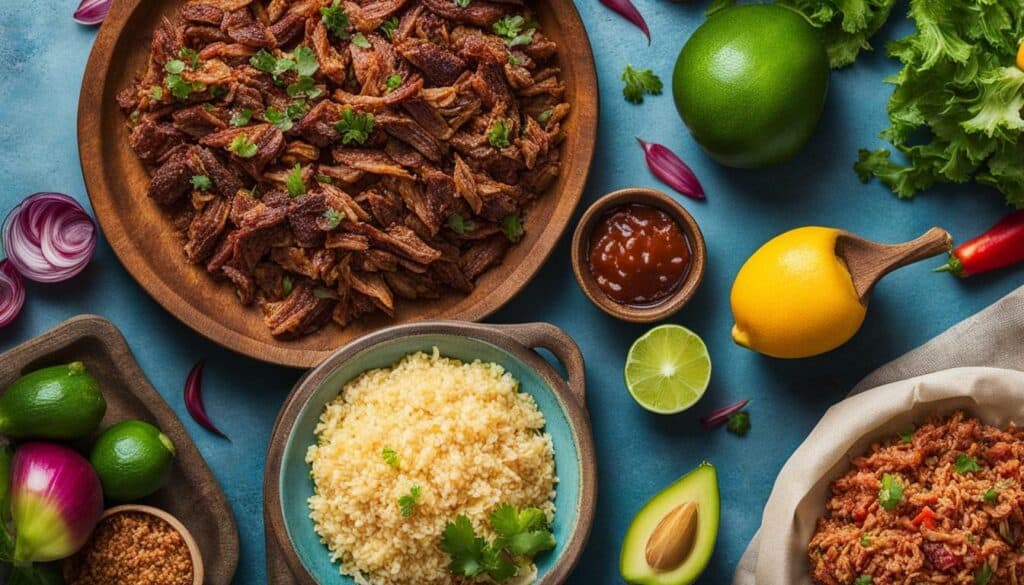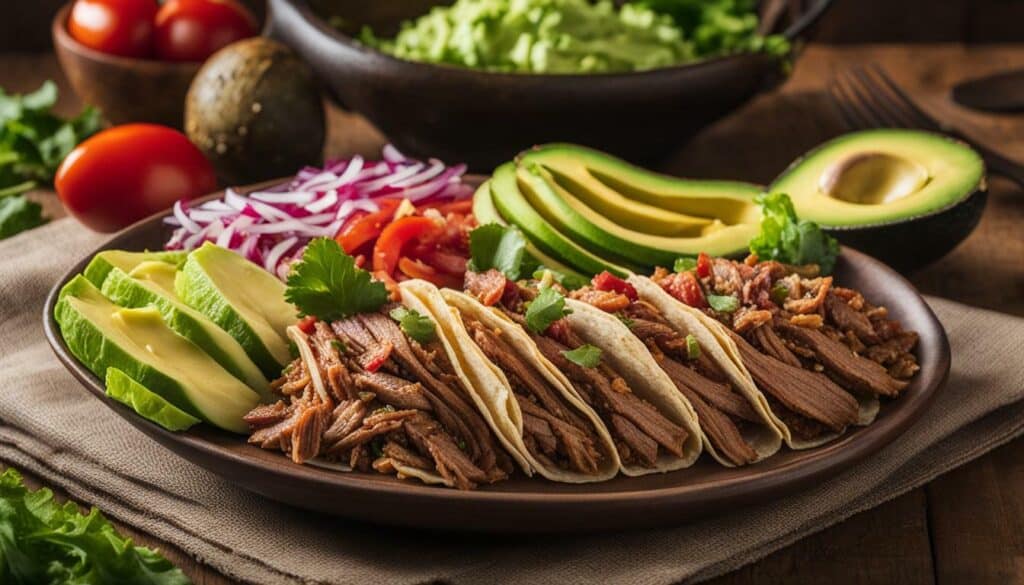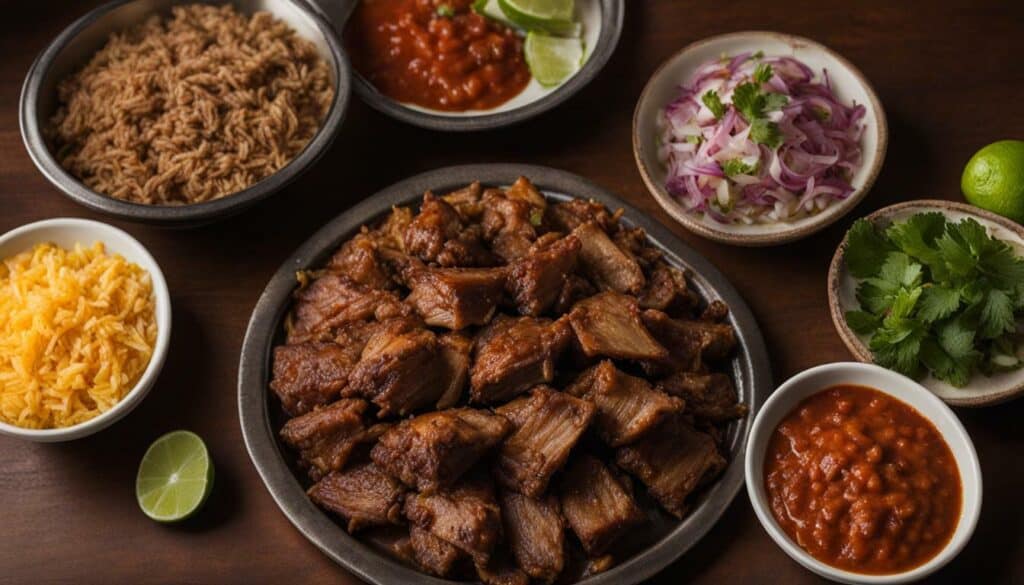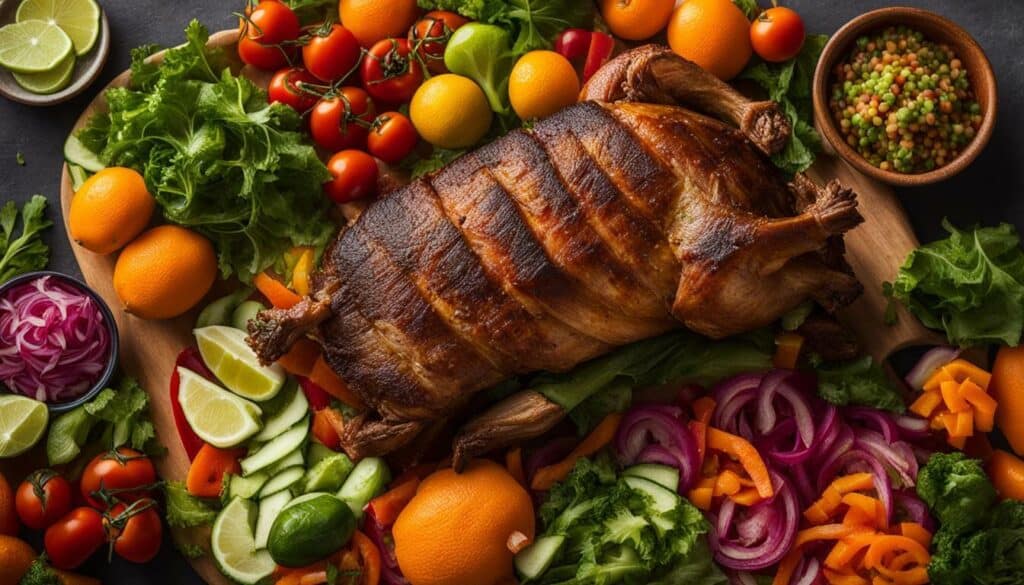Are you curious about the calories in carnitas? In this guide, I’ll take you through the delicious world of carnitas while exploring their nutritional value and caloric content. Carnitas, a traditional slow-cooked Mexican dish, is known for its flavorful and comforting taste. However, it’s important to be mindful of the calorie content to maintain a healthy lifestyle.
Carnitas can vary in their caloric content depending on the recipe and serving size. On average, a typical serving of carnitas contains around 300 calories, with 170 calories in 4 ounces. It also contains 24 grams of fat, which can contribute to the overall calorie count. Carnitas tacos with soft corn tortillas can have around 400 calories, while a larger serving of 7.8 ounces can contain a significant portion of your daily calorie intake at 420%.
To make healthier choices when consuming carnitas, it’s recommended to opt for cooking methods like grilling, roasting, or slow-cooking instead of frying in oil or lard. These methods help reduce the calorie content while still retaining the delicious flavors. It’s also important to be mindful of the toppings added to carnitas tacos, such as guacamole, salsa, and cheese, as they can significantly increase the overall calorie count.
If you’re specifically interested in chipotle pork carnitas, they have a relatively lower calorie count compared to other variations of carnitas, with around 210 calories per serving. However, a bowl of carnitas at Chipotle can contain a higher calorie count of 850 calories, so portion sizes should be considered when indulging in this dish.
To enhance the nutritional value of carnitas, consider adding fresh vegetables to your meal. This not only adds vibrant flavors but also provides additional nutrients and fiber.
- Carnitas can vary in their caloric content, with an average of 300 calories per serving.
- Grilling, roasting, or slow-cooking carnitas can help reduce the calorie count.
- Be mindful of toppings like guacamole, salsa, and cheese, as they can increase the calorie content.
- Chipotle pork carnitas have around 210 calories per serving, while a bowl of carnitas at Chipotle can contain 850 calories.
- Adding fresh vegetables to carnitas can enhance their nutritional value.
Understanding Carnitas’ Caloric Content
Let’s dive into the caloric content of carnitas and understand how it can impact your daily calorie intake. A typical serving of carnitas contains around 300 calories, with 170 calories in 4 ounces. It’s important to note that the calorie count can vary depending on the recipe and serving size.
Carnitas tacos with soft corn tortillas, for example, have 400 calories, while a serving of 7.8 ounces of carnitas contains 420% of your daily calorie intake. It’s crucial to be mindful of portion sizes when enjoying this delicious dish.
If you’re watching your calorie intake, it’s worth considering healthier options for cooking carnitas. Grilling, roasting, or slow-cooking carnitas can help reduce the overall calorie count while maintaining the rich flavor. Fried carnitas, on the other hand, can be higher in calories and unhealthy saturated fat.

Chipotle pork carnitas are a popular variation of the dish, and they contain approximately 210 calories per serving. If you’re a fan of Chipotle’s carnitas, be aware that a bowl of carnitas there contains 850 calories. It’s important to consider portion sizes and the other ingredients in your meal when calculating your overall calorie intake.
When enjoying carnitas, it’s also worth noting the impact of toppings. Adding guacamole, salsa, and cheese to your carnitas tacos can significantly increase the calorie content. While these toppings add flavor, they should be enjoyed in moderation to keep the calorie count in check.
To make your carnitas meal more nutritious, consider adding fresh vegetables as sides or toppings. Not only will they bring vibrant colors and textures to your plate, but they also provide additional vitamins and minerals. Fresh vegetables like lettuce, tomatoes, and onions pair well with carnitas and enhance the overall nutritional value of your meal.
Exploring Nutritional Information
Not only do carnitas satisfy your taste buds, but they also offer some nutritional value. Let’s explore the essential nutrients found in carnitas and how they contribute to a healthy diet.
Carnitas are a good source of protein, providing about 20 grams per serving. Protein is essential for muscle growth and repair, as well as for supporting a healthy immune system. It also helps to keep you feeling satisfied and full, which can aid in weight management.
When it comes to vitamins and minerals, carnitas are rich in several key nutrients. They contain iron, which is important for the production of red blood cells and the prevention of anemia. Carnitas also contain zinc, a mineral that supports immune function and helps with wound healing. Additionally, carnitas are a good source of vitamin B12, which is necessary for proper nerve function and the production of DNA.
Despite their nutritional benefits, it’s important to enjoy carnitas in moderation due to their higher calorie and fat content. Opting for healthier cooking methods, such as grilling or slow-cooking, can help keep the calorie count in check. Adding a variety of fresh vegetables to your carnitas can also enhance its nutritional profile and provide additional fiber and vitamins.
| Nutrient | Amount per Serving |
|---|---|
| Protein | 20g |
| Iron | 2.5mg |
| Zinc | 1.8mg |
| Vitamin B12 | 1.2mcg |

By being mindful of portion sizes and incorporating healthier cooking methods and fresh vegetables, you can enjoy carnitas as a tasty and nutritious part of your diet. Remember to balance indulgence with maintaining a healthy lifestyle overall.
The Impact of Cooking Methods on Calories
The cooking method used for carnitas can have a significant impact on their calorie content. Let’s take a closer look at the low-calorie cooking methods you can choose for your delicious carnitas.
Grilling is an excellent option for making low-calorie carnitas. It allows the excess fat to drips away from the meat, making it a healthier alternative to frying. Whether you’re using a gas grill or charcoal grill, the result is flavorful carnitas with fewer calories. Plus, grilling imparts a smoky and charred taste that adds depth to the dish.
Another low-calorie cooking method for carnitas is roasting. By placing the seasoned pork in the oven at a moderate temperature, you can achieve tender and juicy carnitas without the need for excessive fat. The pork slowly cooks in its juices, creating a rich and flavorful meat that is lower in calories compared to fried carnitas.
Slow-cooking carnitas
Slow-cooking is another fantastic option for creating low-calorie carnitas. Using a slow cooker or crockpot allows the pork to cook slowly over a long period, resulting in tender and succulent meat. Slow-cooked carnitas have a melt-in-your-mouth texture and are a healthier alternative to deep-fried versions. The long cooking time also helps to break down the fat, making the carnitas leaner and reducing the overall calorie content.

By choosing these low-calorie cooking methods for your carnitas, you can enjoy the deliciousness of this traditional Mexican dish without worrying about excessive calorie intake. Remember, it’s all about balance and making informed choices when it comes to the cooking methods and portion sizes of your favorite meals.
Tasty Toppings and Calorie Content
While carnitas alone may not have excessive calories, the toppings you choose can make a big difference. Let’s explore how adding popular toppings can affect the overall calorie count of your carnitas.
When it comes to toppings, guacamole is a fan favorite. Its creamy texture and rich flavor complement carnitas perfectly. However, it’s essential to be mindful of portion sizes as guacamole is high in calories and healthy fats. Just one tablespoon of guacamole can add around 25 calories to your carnitas. While it’s a delicious addition, try to limit your portion to avoid consuming excessive calories.
Salsa is another popular choice to enhance the taste of carnitas. It adds a tangy and refreshing kick to each bite. However, many store-bought salsas can be high in sodium and may contain added sugars. Opt for homemade or low-sodium salsa options to keep the calorie content in check. One tablespoon of salsa adds just a few calories to your carnitas, making it a healthier alternative to other toppings.
| Topping | Calories per Serving |
|---|---|
| Guacamole (1 tbsp) | 25 |
| Salsa (1 tbsp) | 5 |
| Cheese (1 oz) | 110 |
Cheese lovers might enjoy adding a sprinkle of shredded cheese to their carnitas. However, it’s important to note that cheese can significantly increase the calorie count. Just one ounce of cheese adds around 110 calories to your carnitas. If you can’t resist the cheesy goodness, remember to keep your portion sizes in check to maintain a balanced calorie intake.
Remember, indulging in toppings is part of the fun, but moderation is key. By being conscious of your topping choices and portion sizes, you can enjoy the deliciousness of carnitas while still maintaining a healthy balance.

If you’re a fan of Chipotle, you may be wondering about the calorie count of their popular pork carnitas. Let’s take a closer look at the nutritional information of chipotle pork carnitas.
Chipotle pork carnitas have a moderate calorie count compared to other variations of carnitas. A 4-ounce serving of chipotle pork carnitas contains approximately 210 calories. While this calorie count may vary slightly depending on the cooking method and additional ingredients, it is still important to be mindful of portion sizes to control calorie intake.
| Calories | Fat | Carbohydrates | Protein |
|---|---|---|---|
| 210 | 13g | 1g | 23g |
Chipotle pork carnitas are a good source of protein, with 23 grams per serving. However, it is worth noting that they contain 13 grams of fat, which can contribute to overall calorie intake. It’s important to balance your meal with healthier options such as fresh vegetables and whole grains to create a well-rounded and nutritious meal.

When enjoying chipotle pork carnitas, be mindful of any additional toppings or sides that may add to the calorie count. For example, adding guacamole, salsa, or cheese can significantly increase the overall calorie content of your meal. Consider opting for healthier toppings such as pico de gallo or a squeeze of lime juice to add flavor without adding excessive calories.
In conclusion, chipotle pork carnitas can be a delicious and satisfying choice, but it’s important to be conscious of the calorie count. By controlling portion sizes and making healthier choices with toppings and sides, you can enjoy this flavorful dish while maintaining a balanced and nutritious diet.
Portion Sizes and Carnitas Consumption
When it comes to enjoying carnitas, portion sizes play a crucial role in managing your calorie intake. Let’s explore the recommended serving sizes and how to enjoy carnitas in moderation.
A typical serving of carnitas is around 4 ounces, which contains approximately 170 calories and 24 grams of fat. However, it’s important to note that these values can vary depending on the recipe and serving size. For example, if you enjoy carnitas tacos with soft corn tortillas, the calorie count can increase to around 400 calories per serving.
To keep your calorie intake in check, it’s advisable to consume moderate portion sizes of carnitas. A serving size of 4 ounces is a good starting point, but you can adjust it based on your individual needs and goals. If you’re looking to eat a larger portion, consider balancing it out by incorporating lighter sides, such as a fresh salad or steamed vegetables.
Adding fresh vegetables to your carnitas can not only enhance the nutritional value of your meal but also help you feel more satisfied. Vegetables like bell peppers, onions, and tomatoes not only provide essential vitamins and minerals but also add a delightful crunch and burst of flavor to your dish. Consider sautéing or roasting the vegetables alongside the carnitas for a delicious and nutritious meal.
| Serving Size | Calories | Fat (grams) |
|---|---|---|
| 4 ounces | 170 | 24 |
| 7.8 ounces | 420% of daily calories | – |
| Soft corn tortilla carnitas tacos | 400 | – |
Remember, enjoying carnitas is about finding a balance between indulgence and maintaining a healthy lifestyle. By being mindful of portion sizes and incorporating fresh vegetables, you can savor the deliciousness of carnitas while keeping your calorie intake in check.

Adding a variety of fresh vegetables to your carnitas can not only increase the nutritional value but also add a burst of flavor. Let’s discover the best vegetables to pair with carnitas for a healthier and more satisfying meal.
When it comes to enhancing the nutritional profile of your carnitas, incorporating vegetables is a smart choice. Not only do they provide essential vitamins and minerals, but they also add texture and color to your dish. Some great options to consider are:
- Onions: With their savory taste and crunchy texture, onions complement the richness of carnitas perfectly. They are also packed with antioxidants and are a great source of fiber.
- Bell Peppers: Colorful and packed with vitamin C, bell peppers add a refreshing crunch and a hint of sweetness. Opt for a mix of red, green, and yellow peppers to make your carnitas visually appealing.
- Tomatoes: Juicy and bursting with flavor, tomatoes bring a tangy freshness to your carnitas. They are rich in antioxidants and are known for their high lycopene content, which is beneficial for heart health.
- Cilantro: This herb adds a vibrant touch to your carnitas, along with its distinctive citrusy flavor. It’s also a good source of vitamins A and K, as well as antioxidants.
By incorporating these fresh vegetables, you not only boost the nutritional value of your carnitas but also create a more balanced and satisfying meal. So go ahead and experiment with different combinations to find your favorite vegetable medley!

Conclusion
In conclusion, understanding the calories in carnitas is essential for maintaining a balanced and healthy diet. By making mindful choices and considering portion sizes, you can enjoy this delicious Mexican delight while keeping your calorie intake in check.
Carnitas, a traditional slow-cooked Mexican dish, is a flavorful and popular comfort food. However, it’s important to be mindful of the calorie content. A typical serving of carnitas contains around 300 calories, with 170 calories in 4 ounces. It also has 24 grams of fat. The calorie count can vary depending on the recipe and serving size.
Carnitas tacos with soft corn tortillas have 400 calories, while a serving of 7.8 ounces of carnitas contains 420% of daily calories. Carnitas can be high in calories and unhealthy saturated fat if fried in oil or lard. Grilled, roasted, or slow-cooked carnitas are healthier options.
Adding toppings like guacamole, salsa, and cheese to carnitas tacos can significantly increase calorie content. Chipotle pork carnitas have 210 calories per serving, and a bowl of carnitas at Chipotle contains 850 calories. Portion sizes should be considered when enjoying carnitas, and adding fresh vegetables can make it more nutritious.
FAQ
Q: How many calories are in a serving of carnitas?
A: A typical serving of carnitas contains around 300 calories, with 170 calories in 4 ounces.
Q: How much fat is in carnitas?
A: A serving of carnitas contains 24 grams of fat.
Q: Can the calorie count of carnitas vary?
A: Yes, the calorie count can vary depending on the recipe and serving size.
Q: Are carnitas tacos high in calories?
A: Carnitas tacos with soft corn tortillas have 400 calories, while a serving of 7.8 ounces of carnitas contains 420% of daily calories.
Q: Is frying carnitas in oil or lard unhealthy?
A: Yes, if carnitas are fried in oil or lard, they can be high in calories and unhealthy saturated fat.
Q: What are healthier cooking options for carnitas?
A: Grilled, roasted, or slow-cooked carnitas are healthier options compared to frying in oil or lard.
Q: Can adding toppings increase the calorie content of carnitas tacos?
A: Yes, adding toppings like guacamole, salsa, and cheese to carnitas tacos can significantly increase the calorie content.
Q: How many calories do chipotle pork carnitas have?
A: Chipotle pork carnitas have 210 calories per serving, and a bowl of carnitas at Chipotle contains 850 calories.
Q: Why is portion size important when enjoying carnitas?
A: Portion sizes should be considered to control calorie intake while enjoying carnitas.
Q: How can I make carnitas more nutritious?
A: Adding fresh vegetables to carnitas can make them more nutritious and enhance the overall meal.
Which Burger Is Healthier: Chicken Burger or Carnitas?
When it comes to healthy eating and chicken burger choices, it’s important to consider your preferences. While chicken burgers tend to be leaner and lower in calories, carnitas may provide a flavorful alternative. Ultimately, the healthier choice depends on the cooking method, ingredients used, and portion sizes.





Leave a Reply